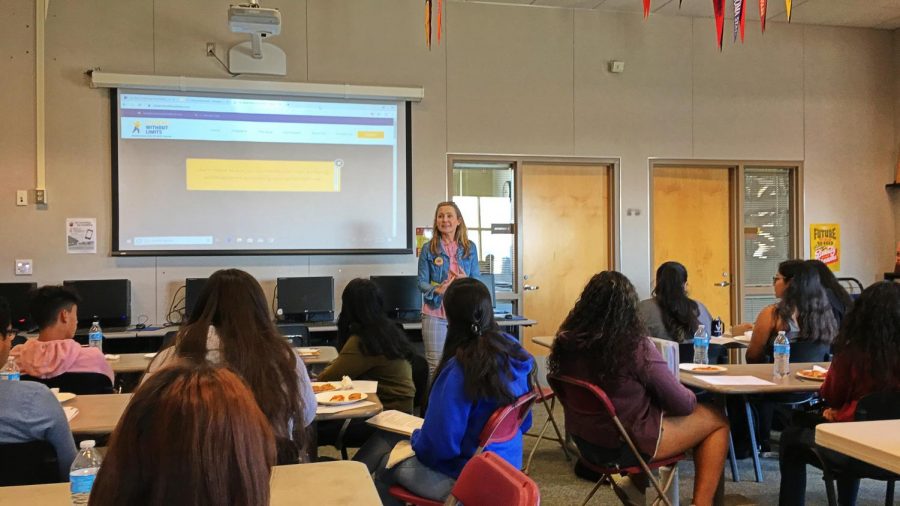Undocumented students await changes on DACA
Photo by Salma Ramirez
Attorny Amie Scully debunks misconceptions about ICE, as she leads her first workshop at Mission Hills High School.
January 12, 2020
San Diego is home to the largest population of undocumented students, making San Diego’s school districts some of the most impacted in the nation by the Trump administration’s anti-immigrant agenda. In efforts to connect at-risk students with the proper resources, the College and Career Center hosted the CEO and founder of Students Without Limits, Attorney Amie Scully, on Nov. 6 to lead a workshop on how to protect themselves in an encounter with ICE and to learn about upcoming changes regarding Deferred Action for Childhood Arrivals (DACA). Based on the needs expressed by students at Mission Hills High School (MHHS), the Students Without Limits organization has agreed to continue providing free legal counseling and make MHHS an official chapter of their organization.
“In San Diego, one out of seven (of all K-12 students) have at least one parent who is undocumented, so these students and families are not alone and there are many who have come before them, fighting for big changes,” Scully said.
Challenging President Trump’s attempt to terminate DACA in 2017, before the start of the acts’ two-year term, a federal judge in California continued to accept renewals from beneficiaries, securing their protection for another two years. But as the two-year term comes to an end, Trump’s continued attempts to end DACA have put its future in the hands of the Supreme Court for a final decision expected no later than June of 2020.
“The Supreme Court case was brought up in my government class, and I was instantly interested because my sister is a recipient of the DACA program and this can affect her greatly if the outcome is negative. Having information is always great, and an attorney will help keep us aware and wanting to learn more,” Brian Ojeda (12) said.
“This is a big time in history where families, students and dreamers are really coming out of the shadows and are not afraid to talk about their status and connect with others and fight for what they are entitled to,” Scully said.
Since their opening in 2017, Students Without Limits has continued to expand their reach throughout San Diego County and is currently partnered with 16 schools.
“Students are empowered by information that they’ve never had their whole lives. They realize opportunities that they never knew about. For example, they learn that ‘wait a minute, I can go to college even though I’m not a citizen?’ or ‘I can get financial aid for college’ and that’s such a huge thing for them to learn. They learn that maybe they qualify for certain immigration options that will help them adjust their immigration status, and that is very empowering and very life changing,” Scully said.
Although the conservative Court is predicted to uphold President Trump’s view on DACA, popular opinion shows a clear inclination towards a more liberal approach, and Chief Justice John G. Roberts Jr. appears to be considering a more humane decision on account of the government’s responsibility for the creation of DACA in 2012. Despite the growing cloud of uncertainty, Attorney Amie Scully assured students that current or past beneficiaries should continue to renew their DACA to secure protection if the program continues.
“In Mexico City the streets were busy and dirty and full of robbery and corruption. My parents didn’t want that for me or my brother, so we migrated to the US. I learned about the Supreme Court decision about a month ago, that the Trump administration wanted to get rid of DACA, and I was questioning a lot: whether or not the president would be able to get rid of the program, if I would still be able to attend a four-year university. As I was applying for DACA, I had to work twice as hard to find which attorney would help me figure out what documents I needed. I think we should improve preparation on what to expect when renewing our application,” Natalie Ramirez (12) said.
Students with further questions on how to renew their DACA and wondering whether they are eligible to get a fee waiver for the application, are encouraged to attend the next meeting with the Students Without Limits organization which will be held on Jan. 15.






